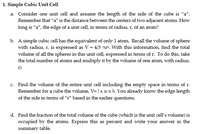
Chemistry
10th Edition
ISBN: 9781305957404
Author: Steven S. Zumdahl, Susan A. Zumdahl, Donald J. DeCoste
Publisher: Cengage Learning
expand_more
expand_more
format_list_bulleted
Question

Transcribed Image Text:1. Simple Cubic Unit Cell
a. Consider one unit cell and assume the length of the side of the cube is "a".
Remember that “a" is the distance between the centers of two adjacent atoms. How
long is “a", the edge of a unit cell, in terms of radius, r, of an atom?
b. A simple cubic cell has the equivalent of only 1 atom. Recall the volume of sphere
with radius, r, is expressed as V = 4/3 r. With this information, find the total
volume of all the spheres in this unit cell, expressed in terms of r. To do this, take
the total number of atoms and multiply it by the volume of one atom, with radius,
r)
c. Find the volume of the entire unit cell including the empty space in terms of r.
Remember for a cube the volume, V=1 xw xh. You already know the edge length
of the side in terms of "r" based in the earlier questions.
d. Find the fraction of the total volume of the cube (which is the unit cell's volume) is
occupied by the atoms. Express this as percent and write your answer in the
summary table.
Expert Solution
This question has been solved!
Explore an expertly crafted, step-by-step solution for a thorough understanding of key concepts.
This is a popular solution
Trending nowThis is a popular solution!
Step by stepSolved in 3 steps with 1 images

Knowledge Booster
Similar questions
- 1. Large biomolecules can be crystallized into lattices with the same unit cell features as more simple ionic solids. In these cases, a lattice point is occupied by one macromolecule instead of one atom or ion. The crystalline form of a certain protein has density 1.287 g/cm³ and face-centered cubic unit cells with length 12.3 nm. What is the molar mass of the protein?arrow_forward1. The radius of gold atom is 1.44 Å. What is the length of the unit cell for gold crystals whose atoms are packed according to fcc lattice?arrow_forwardMetallic strontium crystallizes in a face-centered cubic lattice, with one Sr atom per lattice point. If the metallic radius of Sr is 215 pm, what is the volume of the unit cell in pm³ and in cm³ ? 3 pmº cm³arrow_forward
Recommended textbooks for you
 ChemistryChemistryISBN:9781305957404Author:Steven S. Zumdahl, Susan A. Zumdahl, Donald J. DeCostePublisher:Cengage Learning
ChemistryChemistryISBN:9781305957404Author:Steven S. Zumdahl, Susan A. Zumdahl, Donald J. DeCostePublisher:Cengage Learning ChemistryChemistryISBN:9781259911156Author:Raymond Chang Dr., Jason Overby ProfessorPublisher:McGraw-Hill Education
ChemistryChemistryISBN:9781259911156Author:Raymond Chang Dr., Jason Overby ProfessorPublisher:McGraw-Hill Education Principles of Instrumental AnalysisChemistryISBN:9781305577213Author:Douglas A. Skoog, F. James Holler, Stanley R. CrouchPublisher:Cengage Learning
Principles of Instrumental AnalysisChemistryISBN:9781305577213Author:Douglas A. Skoog, F. James Holler, Stanley R. CrouchPublisher:Cengage Learning Organic ChemistryChemistryISBN:9780078021558Author:Janice Gorzynski Smith Dr.Publisher:McGraw-Hill Education
Organic ChemistryChemistryISBN:9780078021558Author:Janice Gorzynski Smith Dr.Publisher:McGraw-Hill Education Chemistry: Principles and ReactionsChemistryISBN:9781305079373Author:William L. Masterton, Cecile N. HurleyPublisher:Cengage Learning
Chemistry: Principles and ReactionsChemistryISBN:9781305079373Author:William L. Masterton, Cecile N. HurleyPublisher:Cengage Learning Elementary Principles of Chemical Processes, Bind...ChemistryISBN:9781118431221Author:Richard M. Felder, Ronald W. Rousseau, Lisa G. BullardPublisher:WILEY
Elementary Principles of Chemical Processes, Bind...ChemistryISBN:9781118431221Author:Richard M. Felder, Ronald W. Rousseau, Lisa G. BullardPublisher:WILEY

Chemistry
Chemistry
ISBN:9781305957404
Author:Steven S. Zumdahl, Susan A. Zumdahl, Donald J. DeCoste
Publisher:Cengage Learning

Chemistry
Chemistry
ISBN:9781259911156
Author:Raymond Chang Dr., Jason Overby Professor
Publisher:McGraw-Hill Education

Principles of Instrumental Analysis
Chemistry
ISBN:9781305577213
Author:Douglas A. Skoog, F. James Holler, Stanley R. Crouch
Publisher:Cengage Learning

Organic Chemistry
Chemistry
ISBN:9780078021558
Author:Janice Gorzynski Smith Dr.
Publisher:McGraw-Hill Education

Chemistry: Principles and Reactions
Chemistry
ISBN:9781305079373
Author:William L. Masterton, Cecile N. Hurley
Publisher:Cengage Learning

Elementary Principles of Chemical Processes, Bind...
Chemistry
ISBN:9781118431221
Author:Richard M. Felder, Ronald W. Rousseau, Lisa G. Bullard
Publisher:WILEY